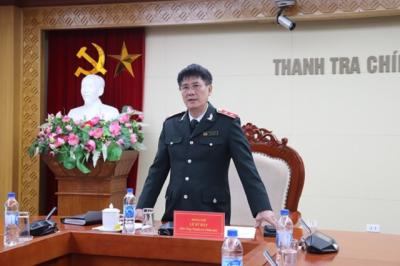The Government Inspectorate released the conclusions of its petroleum management inspections from 2017 to June 2022.

[ad_1]
 The Government Inspectorate released the conclusions of its petroleum management inspections from 2017 to June 2022.
The Government Inspectorate released the conclusions of its petroleum management inspections from 2017 to June 2022.Vietnam – The Government Inspectorate released the conclusions of the petroleum management inspection from 2017 to June 2022
On the afternoon of January 4, at the National Petroleum Supervision Bureau, Deputy Secretary-General Li Xibei presided over a ceremony and announced the conclusions of the inspection of compliance with national petroleum management policies and regulations.
|
Deputy Secretary-General Li Xibei spoke at the meeting and announced the conclusions of the oil inspection – Picture: VGP |
There are many violations in petroleum management
When announcing the inspection conclusions, Deputy Secretary-General Li Xibei expressed his recognition of the efforts made by the Ministry of Industry and Trade and relevant ministries and commissions in managing and operating the oil market and meeting the needs of economic development, and made efforts to control inflation and stabilize economic and social development. Made a contribution. Society… However, the implementation process is not immune to shortcomings and shortcomings.
Deputy Inspector General Li Xibei requested the Ministry of Industry and Trade and other ministries and commissions to instruct relevant units to implement the inspection conclusions as soon as possible and in accordance with the instructions of Deputy Prime Minister Liming Kai.
TTCP will continue to monitor the implementation of post-inspection processing. At the same time, the opinions expressed in the announcement were noted and reported to the Prime Minister in the post-inspection processing results report.
Le Viet Long, chief inspector of the Ministry of Industry and Trade, absorbed all the inspection conclusions and opinions of the TTCP leaders.
When announcing the inspection conclusion, Wu Guogong, deputy director of the TTCP Division 1, read out the content of the inspection conclusion.
According to the inspection conclusion, oil is an important necessary commodity and an “input” factor for production and operation activities; it serves economic and social development and ensures national defense and security. However, during the implementation process, some mechanisms and policies related to the petroleum business have exposed many shortcomings. Some national ministries and commissions have many limitations, drawbacks, and irregularities in the management of petroleum… sometimes leading to interruptions in petroleum supply, affecting energy security and economic development. …
Regarding the issuance of petroleum import and export business licenses and petroleum dealer qualification certificates (TNPP), from January 1, 2017 to June 30, 2022, the Ministry of Industry, Trade and Commerce issued a total of 37 petroleum import and export licenses (excluding sales to sales 4 licenses issued by traders of petroleum to supply aviation activities) and 347 certificates of qualification as TNPP were issued. Pursuant to the provisions of Article 7, paragraph 3, and Article 13, paragraph 2, of Decree No. 83/2014/ND-CP, the conditions for granting licenses and certificates for petroleum warehouses and storage tanks are “…rented for the use of traders” engaged in 5 years or more in oil services business…”.
The above-mentioned permitting of leasing warehouses and oil storage tanks as a condition for the issuance of licenses and certificates does not encourage key oil traders to invest in the development of oil storage, making it difficult to meet the prescribed commercial oil reserve requirements.
Major traders in the oil business and oil multinational producers lease warehouses and oil storage tanks primarily as a condition for applying for licenses and certificates. Many major oil traders and TNPP only sign contracts to lease warehouses and oil storage tanks on a seasonal basis, reducing costs based on actual usage.
This is one of the reasons that led to irregularities by the Ministry of Industry and Trade, major oil traders and TNPP during the licensing stage and enforcement of license conditions.
Inspection of the conditions after the issuance of oil import and export licenses and oil importer qualification certificates. According to the inspection conclusions, from January 1, 2017 to June 30, 2022, after many key oil companies obtained the licenses, traders were operating in the oil industry. The oil distribution system was not ensured as required during the process. Many contracts for leasing warehouses and oil tanks do not involve transportation of goods or liquidation contracts… affecting the supply of oil to the market.
“The Ministry of Industry and Trade’s inspections and supervision are not in place, management is loose, and illegal activities such as failure to promptly discover the maintenance status of warehouses, storage tanks, petroleum distribution systems, etc… and deal with them. According to Article 6 of the Contract Law of the People’s Republic of China, The TTCP confirms Article 8 and Article 14, Paragraph 6 of Decree No. 83/2014/ND-CP”.
In terms of petroleum management, Price Law No. 11/2012/QH13 regulates the stability of gasoline prices through specific pricing, maximum prices, minimum prices or limited-time price frameworks. Currently, the state manages gasoline prices by establishing basic gasoline. However, there are many shortcomings and deficiencies in the construction of benchmark prices, which results in the gasoline benchmark price not following the market and affecting the source and distribution of gasoline. This is one of the causes of oil supply disruptions.
The Ministry of Industry and Trade’s lack of inspection and supervision of key oil traders has resulted in some key oil traders setting oil wholesale and retail prices without basis.
Major oil traders are responsible for mandatory reserves of a 30-day circulating supply, calculated based on one (1) day’s average domestic consumption in the previous year, except that from 2017 to September 30, 2022, there are 15/majors with mandatory reserves of oil. There are 34 oil traders (accounting for 90% of the domestic oil consumption market share) (15/15 based on the number of random inspections). Based on the number of months and days in the month, the total mandatory minimum shortage of oil reserves and production is less than 1 million tons/cubic meter. When supply is in short supply, there are not enough oil reserves to sell on the market, affecting energy security and market stability. This is one of the reasons for recent oil supply disruptions.
Suggestion on entrusting the Ministry of Public Security to receive records and documents of 3 cases
On this basis, the Government Inspector General recommended that the Prime Minister instruct relevant ministries and Dong Thap Provincial People’s Committee to implement mechanisms and policy measures; regarding the review and handling of responsibilities; and economic processing.
In particular, the Government Inspectorate recommended that the Prime Minister entrust the Ministry of Public Security to receive case files and materials for review and processing in accordance with the law, as follows:
First, it is illegal to declare and pay environmental protection taxes on gasoline and oil products; Tianmingde Group Co., Ltd. uses BOG funds.
2. Kawagoe Petroleum Transportation, Trading and Tourism Co., Ltd. illegally declared and paid environmental protection taxes on gasoline and petroleum.
The third is illegal declaration and payment of environmental protection taxes on gasoline and fuel oil; Hai Ha Water Transport Company Limited abused BOG funds to stabilize prices.
In addition, the National Supervisory Yuan will also forward the inspection conclusions to the Central Inspection Committee, which will review and deal with the shortcomings and illegal acts mentioned in the inspection conclusions in accordance with the authority of central managers.
sunlight




